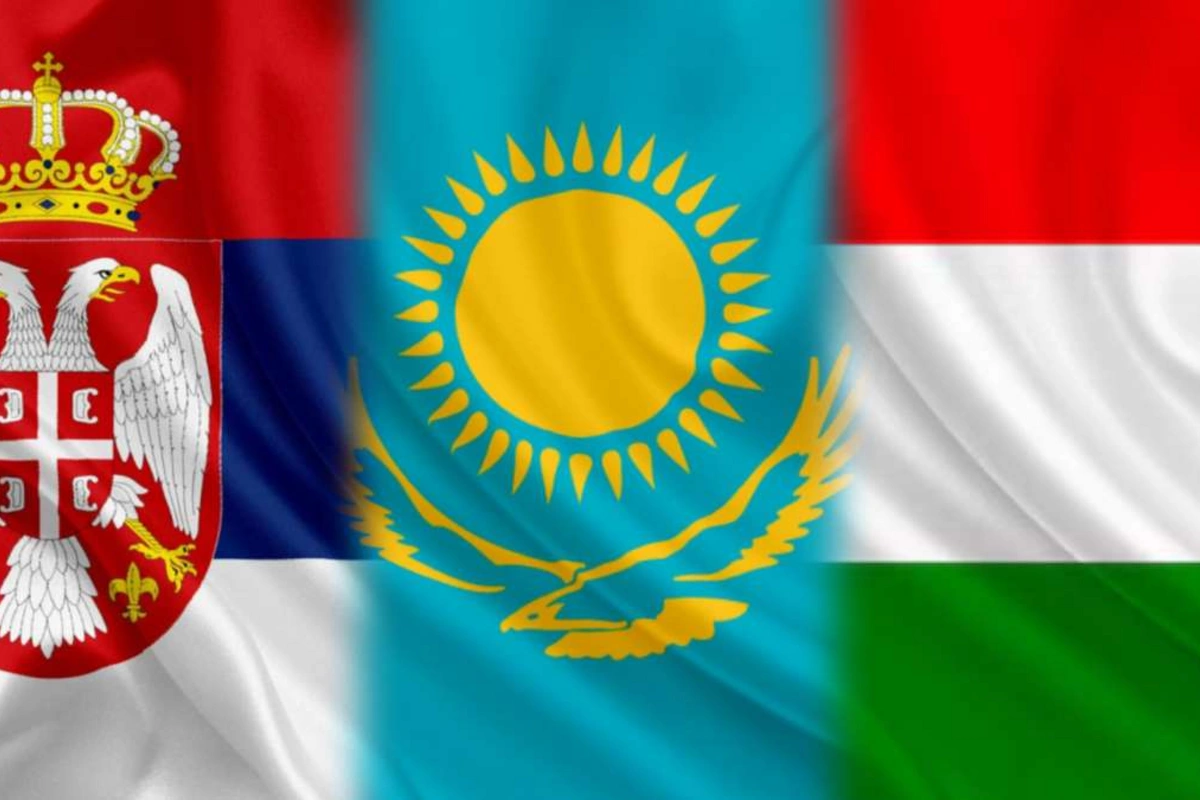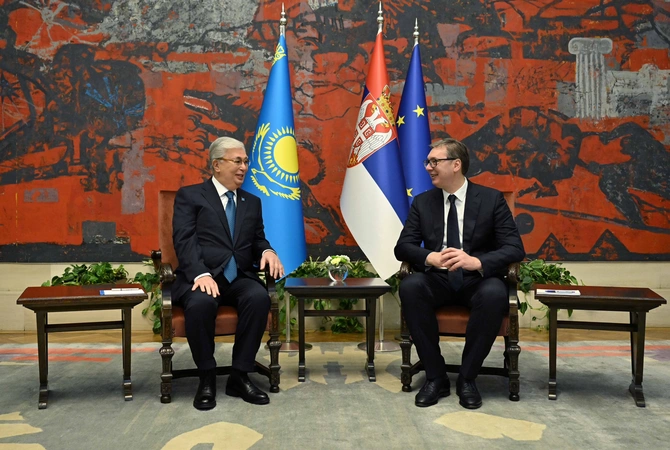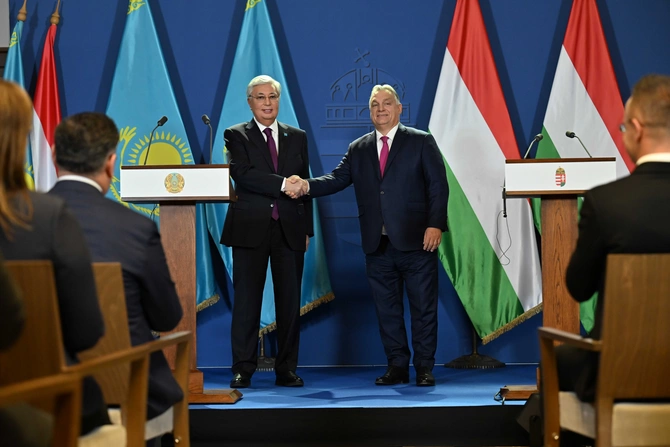
Kazakhstan, Serbia, and Hungary foster a stable cooperation triangle, leveraging their shared multi-vector foreign policy approach. This strategy allows them to diversify global transport infrastructure while building networks of international alliances.
Photo: astanatimes.com
Kazakhstan’s President Kassym-Jomart Tokayev achieved key milestones last week with an official visit to Serbia and a state visit to Hungary. The agreements and discussions during these visits are expected to drive Kazakhstan’s economic modernization, creating new opportunities for trade, investment, and collaboration, The Caspian Post reports citing foreign media.
Kazakhstan, Serbia, and Hungary foster a stable cooperation triangle, leveraging their shared multi-vector foreign policy approach. This strategy allows them to diversify global transport infrastructure while building networks of international alliances. Positioned at a pivotal geographic crossroads, the Balkans serve as Europe’s gateway, while Kazakhstan connects East and West as a vital transit hub.
The relationships extend into multilateral frameworks. Serbia benefits from its Free Trade Agreement with the Eurasian Economic Union (EAEU), while Hungary’s role in the Organization of Turkic States (OTS) bolsters its ties with Kazakhstan. Recent discussions emphasized the breadth of their shared economic, logistical, and strategic interests.
Serbia: economic and strategic ties
President Tokayev’s visit to Serbia was highlighted by a symbolic gesture of presenting a chest of Almaty apples to Serbian President Aleksandar Vučić, garnering widespread local media attention. Belgrade’s iconic tower displayed Kazakhstan’s national flag, marking the beginning of a new chapter in bilateral relations.

Kassym-Jomart Tokayev with Aleksandar Vučić. Photo credit: Akorda
Talks covered a broad spectrum of topics, including regional and international issues and ways to enhance economic cooperation. Tokayev announced plans to reactivate the intergovernmental commission and business council, pledging support for Serbian businesses entering Kazakhstan.
Key focus areas included transport, green energy, and defense, underscored by a new intergovernmental defense cooperation agreement. Serbia, a leading exporter of military goods to Europe, the United States, and Asia, sees potential in collaborating with Kazakhstan.
The IT sector emerged as a high-potential area for synergy. Kazakhstan aims to position itself as a leading IT hub in Eurasia, currently ranking tenth globally in providing online services. Serbia has capitalized on its IT success, generating approximately €4 billion (US$ 4.19) in service exports in 2024. A memorandum on digital development aims to facilitate joint initiatives in technology and innovation.
Agriculture also featured prominently in discussions, with plans to enhance cooperation in genetic resources, organic farming, and biotechnology. Both sides agreed on the importance of academic partnerships to advance agrarian studies.
Transportation connectivity was also high on the agenda, with direct flights between the capitals under consideration.
Alisher Abdreshev, a leading expert at Kazakhstan’s Institute for Strategic Studies, highlighted Serbia’s strategic advantage for Kazakhstan, citing its unique position of maintaining strong ties with the European Union while holding a free trade agreement with the EAEU.
Hungary: A gateway to Europe and the Turkic World
In Hungary, President Tokayev and Prime Minister Viktor Orbán initiated talks informally by attending a UEFA Nations League match between Hungary and Germany. The discussions reinforced Hungary’s dual role as an EU member and an active participant in Turkic integration.

Kassym-Jomart Tokayev and Viktor Orbán at a joint media briefing. Photo credit: Akorda
Hungary, the first European nation to recognize Kazakhstan’s independence, continues to share what officials described as “friendly and brotherly” ties with the country.
Tokayev’s official visit included high-level talks with Orbán, Hungarian President Tamás Sulyok, and Speaker of the National Assembly László Kövér, as well as a Kazakh-Hungarian investment roundtable. The two nations agreed to establish the Kazakhstan-Hungary Investment Fund, a step inspired by Hungary’s role within the Organization of Turkic States (OTS).
Hungary, an observer in the OTS, has invested US$100 million into the Turkic Investment Fund and previously extended a US$1.5 billion credit line to businesses in the OTS member states. Tokayev noted Orbán’s significant contributions to enhancing the OTS’s global role.
Discussions focused on energy, agriculture, logistics, and nuclear industries, aiming to increase bilateral trade to US$1 billion. Several agreements were signed for joint projects, including the constructing of three agricultural feed factories worth US$62 million by Hungarian company UBM.
Tokayev also met Kazakh students in Hungary studying under the Stipendium Hungaricum program, which offers 600 scholarships across 34 institutions.
Advancing the Trans-Caspian Corridor
Kazakhstan, Hungary, and Serbia are aligning their efforts to optimize logistics and transportation. This includes developing new railways, shipping routes, and pipelines to adapt to shifting global trade flows.
Serbia faces challenges in transporting oil via the Black Sea, a high-risk shipping zone. A new pipeline linking Serbia to Hungary’s Druzhba branch is planned within three years, complementing Kazakhstan’s existing use of the pipeline’s northern branch for oil exports to Germany.
Hungary also explores alternative transport routes, leveraging its strategic position as Europe’s gateway between the continent and the Turkic world.
Bagdad Amreyev, the President of the Turkic Investment Fund, emphasized Hungary’s geographical advantage in bridging East and West.
“Developing the Trans-Caspian Corridor demands substantial investment, and our fund is ready to support this effort by engaging international institutions and regional partners,” said Amreyev.
The TITR offers a vital alternative for Europe-Asia freight transport. Rising maritime shipping costs—exacerbated by security risks in the Red Sea—have driven demand for TITR, with container traffic soaring 2.6 times year-on-year in 2024.
Key points along the Trans-Caspian route now feature expanded terminal networks. In Kazakhstan, projects include a container hub in Aktau Port, enhanced infrastructure at the Kazakhstan-China border, and other initiatives. Strengthening the European section of the route is also critical.
A joint council involving transport ministers from Türkiye, Serbia, Hungary, and Bulgaria is advancing rail freight infrastructure. The Central Asia Regional Economic Cooperation Program underscores TITR’s potential to complement maritime and Northern corridors, boosting trade flows between China, Europe, and Central Asia.
Share on social media